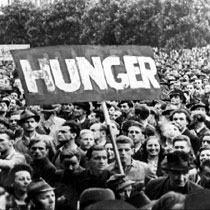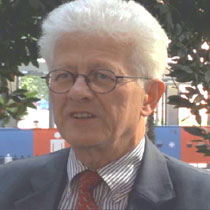2007年VOA标准英语-Marshall Plan 60th Anniversary Approaches(在线收听)
Washington
01 June 2007
On June 5th, 1947, U.S. Secretary of State George C. Marshall told the graduating class at Harvard University that Europe and the world were in a perilous state. World War II had devastated the continent and he said the U.S. must do everything it could to return Europe to economic health. Marshall's Harvard speech was the foundation of the so-called Marhsall Plan, a four year, $13 billion foreign aid program. George Lewinski reports.
 |
| Western Europe needed help after the end of World War II |
Dr. Larry Bland, a historian at the George C. Marshall Foundation, spoke about the Marshall Plan. "The prime motivation for launching the Marshall Plan was fear of chaos in Western Europe. You saw this if you went to the movies every weekend. On the beginning of the feature they would show problems in Europe on the newsreels. Starving women and children affect American hearts. So that there's the aspect of women and children in Western Europe. But also the strength of the communist party in countries like France and Italy was very worrisome.
Communist parties were powerful in France and Italy. Eastern Europe was occupied by the Soviet Army. There was massive unemployment. Europe's industry was at a standstill.
Immediately after providing emergency supplies of food and clothing, the U.S. Marshall plan focused on economic chokepoints. Coal mines were the first to benefit.
Without coal to fuel factories and mills, Europe's economy would never recover.
Mr. Bland says, "The problem is much of the coal in Western Europe comes from German mines which are flooded and the surface effectively bombed. The Germans have no means of opening these mines and the U.S. is going to provide certain key equipment. The Germans are going to mine all the coal, but we're going to pump out the mines and rebuild workers' housing and vaccinate them against TB and other things that will allow them to work very hard."
And the U.S. insisted the Europeans co-operate to move that German coal to the other nations on the continent to heat homes and get the factories moving again.
The United States authorized $13 billion over four years -- the equivalent of a $100 billion today spread over 16 countries.
But perhaps the most important part of the Marhsall Plan was its effect on the morale of Western Europeans. Even former enemies -- Italians and Germans -- were included.
 |
| Karsten Voight |
Winston Churchill called the Marshall Plan the 'most unsordid act' in history. The recovery from the most destructive war in history was dramatic.
Western Europe's gross national product went up 32 percent in the 4 years of the Marshall Plan's existence, sparked a generation-long economic boom and provided the framework for what eventually became the European union.